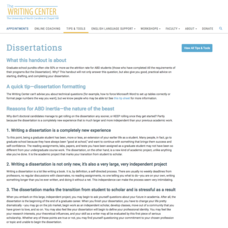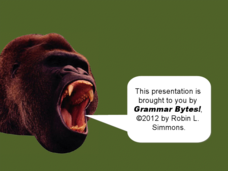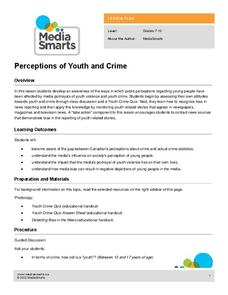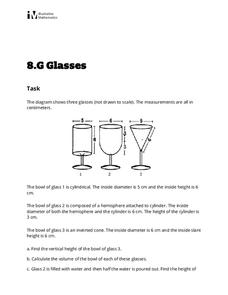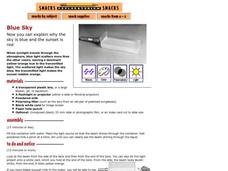CK-12 Foundation
Determining the Equation of a Line: Trip Functions
Let the function drive the activity. The interactive displays the odometer on a car for a trip. Pupils determine and interpret the slope of the situation. Then, they find a verbal description of the equation of the function.
Minnesota Literacy Council
Introduction to Historical Thinking
Christopher Columbus: hero or villain? Prepare class members for the debate with activities that asks them to think critically about how history is reported.
University of North Carolina
Dissertations
Bring on the coffee—it's dissertation time! As a handout on dissertations explains, over 50 percent of PhD candidates never finish their dissertations. The handout, part of a larger series on specific writing styles, helps motivate...
Biology Junction
Plasma Membrane – Gateway to the Cell
Just as skin covers your body limiting what can go in and out, plasma membranes cover cells to do the same. Scholars begin with a presentation that gives overview of the structure and function of plasma membranes. Then, they learn how...
Workforce Solutions
Survivor Island
Decisions, decisions! Small groups decide on their dream career then enter a scenario that challenges them to make another big decision—if stranded on a deserted island, who would be saved or fed to the sharks. Because decisions are...
Curriculum Corner
Fiction Graphic Organizers
Accompany fictional reading with a activity that compares a story's characters, setting, and theme.
Under the Dome
The Candy Bowl
Wonder how many pieces of candy a teacher can eat. Pupils watch a video of candy in a bowl as some candy is removed to be eaten and others are added. Learners devise questions about the situation along with estimated solutions. Scholars...
Curated OER
Classify Machines that Fly!
Eighth graders explore flight and the dichotomous key. In this flight lesson, 8th graders gain understanding of the dichotomous key and create one of their own. Students then use their dichotomous key to classify types of aircraft.
Curated OER
Fall Around the World
What is autumn like in Shanghai? How much rain falls during September in Sydney? Is Moscow cold in October? Take a virtual trip around the world with a research assignment on autumn in different countries. After learners answer questions...
Curated OER
Elmer the Elephant
Students read "Elmer" by David McKee. They answer comprehension questions and discuss how Elmer looks and how he is different from the elephants they see in the zoo. They complete a project in which they celebrate their individual...
Baylor College
Heart Rate and Exercise
What is the relationship among the heart, circulation, and exercise? Your class members will explore first-hand how different physical exercises affect an individual's heart rate. They will begin by learning how to measure their own...
Carolina K-12
Comparing Economic Systems
How do people make decisions in a world where wants are unlimited but resources are not? How do individuals and governments utilize scarce resources (human, natural, and capital) in different economic systems? Introduce your learners to...
Curated OER
Fossil Fuels (Part II), The Geology of Oil
More of a mini-unit than a lesson, these activities lead inquisitors through a survey of oil deposits. In the first part, they read about and view diagrams of sedimentary rock layers that trap oil. Next, they test porosity and...
Curated OER
Conocer/Hacer
After reviewing the Spanish verbs conocer and haber, students must answer twenty-five fill-in-the-blank sentences. They must choose from the different conjugated forms of conocer and haber to complete each sentence. Tip:...
Curated OER
Pronoun Case
Whether viewed as a whole class, or individually, this PowerPoint is a fabulous resource for teaching and reinforcing the rules of pronouns. There are 22 slides total; the first nine explain the differences between subjective, objective,...
Curated OER
Sense, Sensibility and Sentences: Examining and Writing Memorable Lines
Involve your readers in finding works of literary genius. Have each individual write down compelling sentences that they read or hear, whether in a newspaper, advertisement, book, movie, song, or any other place! Once each person has a...
Media Smarts
Perceptions of Youth and Crime
Explore the potential for bias in the news and in scholars' own attitudes and opinions. Begin with a quiz on youth crime to see how learners perceive crime among their peers. After looking at the correct answers, put individuals in...
Media Smarts
You Be the Editor
Look at different case studies to discuss the ethics of journalism. Twelve real-life events are written up and your learners get to be the editors. Encourage your class to think about the implications of publishing decisions. After each...
Scholastic
Study Jams! The Nervous System
Get your class thinking with animations of neurons in action and explanations of how stimuli is transported and processed. This film makes an ideal introduction or review of the nervous system. The parts of the brain and what they...
Illustrative Mathematics
What is a Trapezoid? (Part 1)
Challenge your class to construct a definition for trapezoids. Looking at four examples and four non-examples, students individually create definitions and use them to classify an unknown shape. Allow for small group and whole-class...
Curated OER
Glasses
Provide your class some practice with the dimensions of geometric figures. Here you have a set of three different-shaped, stemmed drinking glasses with diameters and heights provided. Math-minded individuals calculate the volume of each....
Exploratorium
Blue Sky
Use a container full of water as a prism and show that as light is bent, the individual colors from different wavelengths become visible. This explains why the sky appears to be blue midday, and why as the sun nears the horizon, it looks...
It's About Time
More Chemical Changes
Generate entertainment by assisting students in creating multiple chemical changes during the course of small experiments integrated into one packed lesson. Individuals observe examples of chemical changes as they occur and gather...
PhET
Beer's Law Lab
Beer's Law can be used to measure the concentration of certain compounds in samples of food. In the concentration simulation, particpants change and measure the concentration of different solutions by manipulating various types of...




